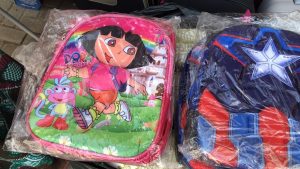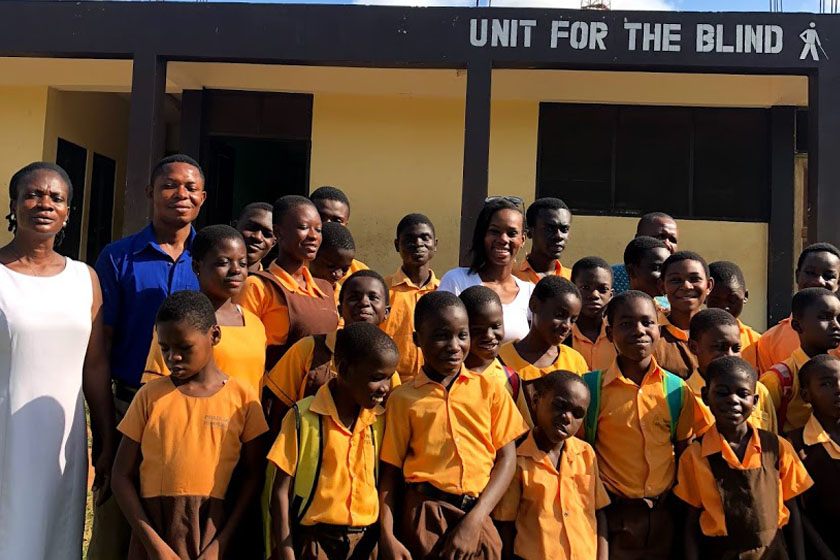Whenever there is an opportunity to support young learners, Sierra Dockery ’12 will always be “all-in.”
In September 2018, Dockery gave a three-day workshop to 33 P-20 educators at the School for the Blind in Cape Cove, Ghana. It was a trip she never expected to take.

Sierra Dockery and her colleagues used funds to purchase what students in Ghana said they needed most, including the backpacks pictures here, as well as new clothes and other basic essentials.
She received a call a few months earlier from her former mentor from Chicago Public Schools (CPS), Denise Allen, who was collaborating with a U.S.based nonprofit on a service trip to the African nation. The group wanted to provide the school with educational technology. Allen knew her colleague could help “deliver the goods.”
Dockery gathered educational tools she could spare from her own stock and leveraged professional connections to offer up an impressive array of resources for Allen.
“I called her back a few weeks later and said, ‘Denise you’re going to need a couple of extra suitcases.’”
Allen, who retired from CPS in 2016, decided she needed to bring along more than just the luggage. She funded Dockery’s flight, found a place for her to stay at the school, and, most importantly, made sure her colleague had the opportunity to teach multiple workshops.
Identifying the need
Dockery trained the Ghanaian teachers on how to use iPads, laptops, voice over technology, a braille coder, and an embosser (to turn traditional text to braille). She also demonstrated how to incorporate learning standards, which Ghana had only recently started to require of its teachers. Unlike in the U.S., there was no specific vision curriculum for educators to follow and no funds to support continuing education.
“The teachers told me it was the first time they had received training in 13 years,” Dockery said.
Dockery explained that the school is unable to employ vital personnel for their student populations, which would include speech pathologists, vision teachers, physical therapists, and occupational therapists.
“Those educators are experiencing what we are experiencing here in the U.S. They are seeing children who are autistic and those who have multiple disabilities, but they possess no formal training on how to work with kids with cognitive disabilities, intellectual disabilities, etc.”
“It’s scary for them because they are asking ‘What do we do?’” she said.
When Dockery started talking about implementing learning standards, the Ghanaian educators had no shortage of questions.
“They asked ‘How do U.S. teachers deal with standards and make sure the students acquire the other necessary skills and knowledge?’ I said, ‘Your lesson drives the standard, but your responsibility as a special education teacher is to take the standard and break it up.’”
The teachers also needed Dockery to illustrate how to break up a standard within a lesson. It was clear that more help was needed, and before she left for the states, Dockery vowed to return.
“But I knew it couldn’t be just me, and I knew it had to be longer than three days in order to make a tangible difference,” she said.
Making it happen
Dockery will fulfill her promise to return to Ghana in March of 2020. To do so, she created her own new nonprofit and has recruited seven teachers to come with her, including multiple Redbirds. The acronym for the organization is CHAMPS, which stands for Compassionate Hearts Accepting Multitudes of Purposes in the Season.
“The name is a mouthful, but it really gets to the heart of what we do,” she said. “No matter when or where we meet our students, we as educators have to have the heart and the compassion to accept them where they are at and to prepare them for any season they are entering, whether it’s fourth grade, post-secondary schooling, or the job market.”
The 2020 trip will last two weeks, the first for training, and the second will be about implementation. In addition, Dockery and the other U.S. teachers will also be available via videoconference throughout the semester to answer any follow-up questions.
Dockery plans to scale the efforts, and the Ghanaian-based school will serve as the hub of support across multiple countries.
“Although our heart will start in Ghana, the goal would be to branch off and to help as many schools for the blind as possible across Africa,” she said.
In addition to visiting other schools, the group will help to create training videos showing the Ghanaian teachers implementing best practices in their own classrooms. The goal is for them to become experts and trainers for other African educators.
“Educators in Nigeria, Kenya, and southern African nations will be able to access videos of the training and continuing education courses on the Ghana school’s website. Those videos will eventually show people who look like them and speak like them, and hopefully inspire them to think ‘If the staff in Ghana can do this, we can accomplish the same thing.’”
“That is the big, big picture, and we are likely years away from it. However, we are motivated to make a difference and see it through,” Dockery said.
The Illinois State effect
Dockery credits Illinois State for preparing her with the skills, knowledge, and confidence to make a positive influence on marginalized populations like the ones in Africa. Before she made the trip, the Redbird spent four years serving in as a resource teacher. She moved to Kankakee County in 2017 and now serves as special education in the Bradley-Bourbonnais school district.
“I can honestly say that Illinois State, the vision program, and the Department of Special Education prepared me beyond my wildest expectations,” she said.
“We completed intensive clinical experiences over three semesters during practicum, field base, and then student teaching. We also ate and slept SMART goals,” she said.
During her first year as a practicing teacher, Dockery’s principal was so impressed by her ability to create her own SMART goals that she asked the beginning teacher to conduct a training for the school’s veteran educators.
“That early experience was so important, and I believe Illinois State is the reason I can confidently support teachers in another country to write goals, implement strategies, and use technology to meet their goals,” she said. “My experiences at Illinois State made it possible for me to lead this effort.”
About the kids
During her time in Ghana, Dockery learned from the school’s headmaster that the government only funds the school’s most basic needs, like food, and payments are always two-three months late.
The students, who live at the school, only asked for inexpensive items and the bare essentials.
“One little boy who was blind said he just wanted a bible he could hear or read. Others asked for belts, sandals, and new uniforms since they had been passed down for years,” Dockery said. “We took the money the organization had collected for the school, about $2,000, and we went back to the market and bought them these things.”
Dockery said the children also did not have books in braille about their own culture. There was nothing available that told them about Africa, Ghana, or their currency.
“And the books they did have were outdated and almost in unusable condition,” she said.
The situation brought Dockery to tears multiple times throughout the trip, and her desire to improve these vulnerable students’ lives fuels her recent effort to form CHAMPS.
“Students are the reason why we have jobs. It’s not for anything other than the kids,” Dockery said. “The difference you are able to make supersedes the money you would be able to get doing something else.”

